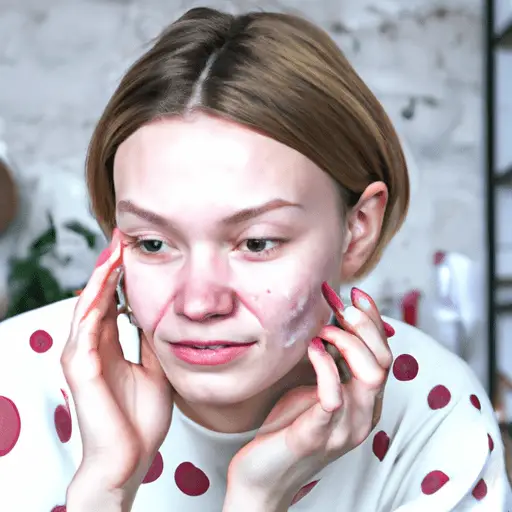-
Table of Contents
- A Dermatologist Skincare Routine for Acne-Prone Skin
- Key Takeaways
- Introduction: The Battle Against Acne
- Understanding Acne-Prone Skin
- The Dermatologist’s Skincare Routine
- Cleansing
- Treating
- Moisturizing
- The Role of Diet and Lifestyle
- FAQ Section
- 1. Can I use makeup if I have acne-prone skin?
- 2. How often should I wash my face?
- 3. Can diet cause acne?
- 4. Can stress cause acne?
- 5. When should I see a dermatologist for my acne?
- Conclusion: Winning the Acne Battle
- Key Takeaways Revisited
A Dermatologist Skincare Routine for Acne-Prone Skin

[youtubomatic_search]
Key Takeaways
- Understanding the nature of acne-prone skin is crucial in developing an effective skincare routine.
- Dermatologists recommend a simple, consistent skincare routine for acne-prone skin.
- Choosing the right products, specifically non-comedogenic ones, is essential.
- Proper diet and lifestyle habits also play a significant role in managing acne.
- Consulting a dermatologist is advisable for severe acne conditions.
Introduction: The Battle Against Acne
Acne is a common skin condition that affects millions of people worldwide. It is particularly prevalent among teenagers, but it can affect individuals of all ages. For those with acne-prone skin, establishing an effective skincare routine can be a daunting task. This article explores a dermatologist-recommended skincare routine for managing acne-prone skin.
Understanding Acne-Prone Skin
Acne-prone skin is characterized by frequent breakouts, usually due to overactive oil glands. When excess oil combines with dead skin cells, it can clog pores, leading to the formation of acne. Factors such as hormones, diet, stress, and certain medications can exacerbate this condition.
The Dermatologist’s Skincare Routine
Dermatologists recommend a simple yet consistent skincare routine for acne-prone skin. This routine typically involves three steps: cleansing, treating, and moisturizing.
Cleansing
Cleansing is the first step in any skincare routine. It helps remove excess oil, dirt, and makeup that can clog pores. Dermatologists recommend using a gentle, non-comedogenic cleanser twice a day.
Treating
After cleansing, the next step is to treat the acne. Over-the-counter treatments containing salicylic acid or benzoyl peroxide can be effective. However, for severe acne, a prescription treatment may be necessary.
Moisturizing
Despite the common misconception, moisturizing is essential for acne-prone skin. It helps maintain the skin’s natural barrier and prevents dryness, which can trigger more oil production. Dermatologists recommend using a non-comedogenic moisturizer that won’t clog pores.
The Role of Diet and Lifestyle
While skincare products play a significant role in managing acne, diet and lifestyle habits are equally important. Consuming a balanced diet rich in fruits, vegetables, lean proteins, and whole grains can help maintain healthy skin. Regular exercise, adequate sleep, and stress management techniques can also contribute to better skin health.
FAQ Section
1. Can I use makeup if I have acne-prone skin?
Yes, but choose non-comedogenic products that won’t clog your pores. Also, always remove your makeup before bed.
2. How often should I wash my face?
Dermatologists recommend washing your face twice a day and after sweating.
3. Can diet cause acne?
While the link between diet and acne is still under research, some studies suggest that certain foods, such as dairy and high-glycemic foods, may trigger acne.
4. Can stress cause acne?
Yes, stress can trigger acne by increasing the body’s production of certain hormones that stimulate oil glands.
5. When should I see a dermatologist for my acne?
If your acne is severe, causing emotional distress, or not responding to over-the-counter treatments, it’s time to see a dermatologist.
Conclusion: Winning the Acne Battle
Managing acne-prone skin requires understanding its nature and adopting a consistent skincare routine. Choosing the right products, maintaining a healthy lifestyle, and consulting a dermatologist when necessary are all crucial steps in this journey. Remember, every skin is unique, and what works for one person may not work for another. Therefore, it’s essential to listen to your skin and adjust your routine as needed.
Key Takeaways Revisited
- Acne-prone skin requires a simple, consistent skincare routine involving cleansing, treating, and moisturizing.
- Choosing non-comedogenic products is crucial to prevent pore-clogging.
- Diet and lifestyle habits significantly impact skin health.
- For severe acne conditions, consulting a dermatologist is advisable.
- Every skin is unique, and skincare routines should be adjusted as per individual needs.
[youtubomatic_search]

Leave a Reply